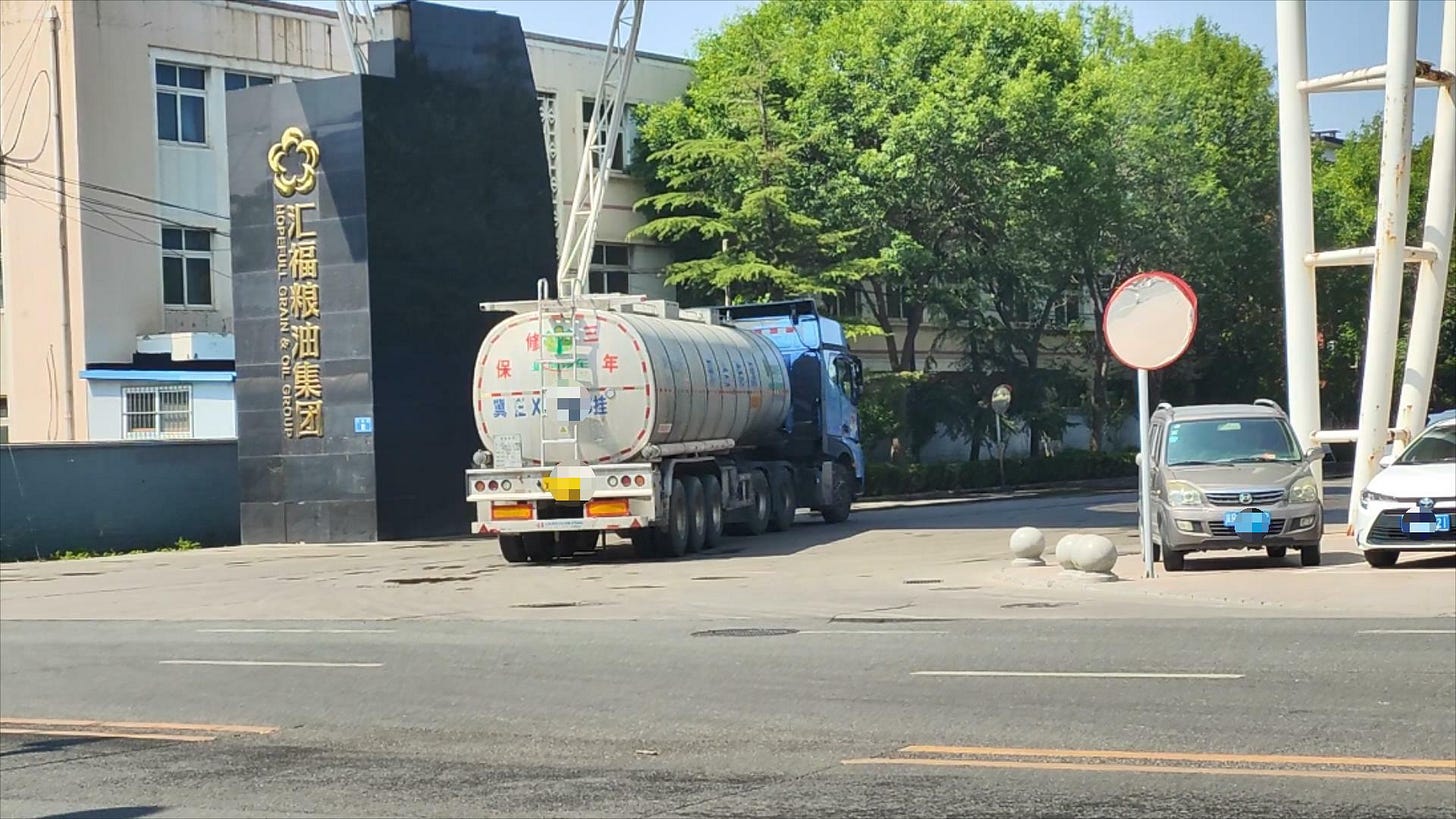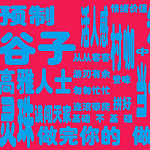Welcome to RealTime Mandarin—a multimedia resource to immerse you in the latest Chinese language trends, inspire you to practice and improve your Mandarin every week, and empower you to communicate with confidence.
Subscribe now to get the next issue straight to your inbox!
A food safety scandal is causing mounting public outrage in China, following an investigative report by Beijing News (新京报) published on July 2.
According to the journalist who uncovered the scandal, Hán Fútāo 韩福涛, fuel tankers used to transport cooking oil (食用油) are also being used to transport coal-derived fuel oils (煤制油), and other petrochemicals.
Han's report begins with him following the journey of a tanker filled with cooking oil:
On the morning of May 21 at 10 a.m., a tanker truck slowly drove into a grain and oil company in Yanjiao, Hebei. An hour later, it left the factory loaded with over thirty tons of soybean oil.
What is little known is that three days earlier, this same tanker, now full of edible soybean oil, had transported a load of coal-based oil from Ningxia to Qinhuangdao, Hebei.
After unloading, the tanker was immediately loaded with the soybean oil, without being cleaned before taking on its new load.
5月21日上午十点,一辆罐车缓缓驶入河北燕郊一家粮油公司。一个小时后,这辆罐车满载三十多吨大豆油驶出厂区。
鲜为人知的是,这辆满载食用大豆油的罐车,三天前刚将一车煤制油从宁夏运到河北秦皇岛,卸完后并未清洗储存罐,就直接来装上食用大豆油继续运输。
(Yanjiao is well known to readers of this newsletter, as it was the site of a deadly gas explosion in March this year.)
Han goes on to reveal that it's an “open secret” (公开的秘密) that the tankers are not washed or disinfected in between deliveries, according to one truck driver interviewed:
"It is an open secret in the tanker transportation industry that food-grade liquids and chemical liquids are transported in the same containers without cleaning in between."
“有罐车司机向新京报记者透露,食品类液体和化工液体运输混用且不清洗,已是罐车运输行业里公开的秘密。”[1]
The driver goes on to explain that the only thing that does happen between loads is the “fuel oil” sign on the side of the tanker is removed and replaced with one which says “cooking oil”.
Implicated in the scandal are a Tianjin subsidiary of the state-owned stockpiler of commodities and food products, Sinograin (中储粮), a huge wholesaler of cooking oil. The private conglomerate, Hopefull Grain and Oil Group (汇福粮油集团), is also involved, which purchases the cooking oil in bulk from Sinograin and distributes it to buyers such as restaurant chains, and food brands.
Both companies have reportedly launched their own internal investigations. Sinograin has come under heavy criticism for not fully apologising, only saying in its statement that "learned had been lessons" (引以为戒).
As well as a public outcry on social media, the report has prompted harsh criticism even from state media.
The original report in Beijing News, itself a state-run media outlet, is still accessible in China, for now. But as Yaling Jiang explains, the country’s censorship and propaganda machines are busily guiding public opinion, with certain stories being pushed to the top of hot search lists on social media platforms (like the one about a food safety scare in Japan), while many posts related to the cooking oil story are being removed, according to China Digital Times.
The reports on the scandal reveal a dark and under-regulated sector in China.
You need to know three phrases to explain what’s going on.
“Chaotic practices” (乱象)
Under China’s food safety laws, standards for cleaning tankers transporting cooking oil are “recommendations” (推荐性), and not laws.
China, therefore, does not have mandatory national standards for the transportation of edible oils. The recommendations mention that dedicated vehicles should be used for transporting bulk edible vegetable oil, but it is not mandated.
This means the system, and the rules, are open to interpretation by companies looking to make a short-term profit.
“Intense competition” (竞争加剧)
Coupled with the lack of regulation, transporting edible oil has become less profitable in recent years. Whereas transporting fuel oils pays much more.
"In the past, tanker trucks transporting edible oil previously would generally return empty. For example, from Tianjin to Xi'an, the one-way freight rate used to be over 400 yuan per ton, but now it has dropped to around 200 yuan".
“以前运食用油的罐车一般空车返回,以天津到西安为例,最早单程运费报价都在每吨400元以上,现在降到200元左右。”
This fall in price, in addition to an increase in the number of tanker trucks on the roads in recent years, has intensified competition.
This has forced many tanker trucks to find ways to carry cargo on their return trips, turning to the more profitable coal-based oils.
"It’s difficult to find cargo around the unloading area, so they typically load whatever is available. In recent years, there has also been a high demand for transporting coal-based oils from Ningxia."
“卸货地周边很难配货,一般有什么就装什么,这几年宁夏那边煤制油运输需求也大。” [1]
“Exploiting loopholes” (钻空子)
The cost of cleaning tankers between deliveries is prohibitively high.
And where the responsibility lies for cleaning tankers transporting edible oils is unclear, according to another driver interviewed:
"The oil producers are not in charge of it, and the purchasers are not aware of it, which leaves a loophole for the tanker companies to exploit. This means it's down to the boss of the transport company to decide if the truck should be cleaned."
“卖油的厂家不怎么管,买油的公司不知情,让运输公司钻了空子。老板让清就清,老板不让清就不清,老板的事。”[1]
Given the prohibitively high costs of cleaning, and shrinking profit margins, executives (and truck drivers) of transport companies see no benefit in taking responsibility for the cleaning of trucks.
So it’s this mix of factors which has brought about this contaminated cooking oil controversy.
Food safety scandals are always big news in China.
We’ve looked a few in this newsletter in recent years. Like when a soy sauce brand was caught using “hex technology (海克斯科技)” in its ingredients in October 2022; or when the Nanchang government, police, and a college canteen were accused of "pointing at a rat and calling it a duck" (指鼠为鸭) when a student found a rat’s head in his lunch.
But the cooking oil scandal is different to these two recent food safety incidents.
It's a food safety crisis at a state level, and on an industrial scale. Some suggest it is China's worst food safety scandal since the Sanlu contaminated milk story of 2008, which resulted in 300,000 children becoming sick and at least six dead after drinking powdered milk contaminated with high levels of melamine.
"Gutter oil" scandals are another common food safety issue in China.
Gutter oil (地沟油) is the illicit practice of restaurants reusing cooking oil that has already been cooked for longer than safety rules permit. There have been a number of high profile “gutter oil” scandals in China since the early 2000’s.
China's latest food safety scandal has gotten too big too quickly, and potentially affects too many people, for it to simply be censored away. Some commentators reckon the exposé by Beijing News, will lead to the government finally taking decisive action in cleaning up the sector and its chaotic practices.
So, that's what we're exploring this week!
Favourite Five
1. 乱象 luàn xiàng
chaotic practices
他呼吁重视这样的行业乱象,因为食用油关系到千家万户 - He believed it is important to raise awareness for such industry malpractices, as edible oil is consumed by everyone. [1]
2. 钻空子 zuān kòng zi
exploit loopholes
我们不能高估一些国内企业在钻空子上的底线 - We must not underestimate how low some domestic companies could stoop to when it comes to exploiting loopholes. [3]
More: Read more about this phrase in Phrase of the Week in Sinica tomorrow.
3. 地沟油 dì gōu yóu
gutter oil
中国人的命也是命,凭什么就只能吃有毒的地沟油 - Chinese lives matter too, so why should they be fed with poisonous gutter oil? [3]
More: A general term of cooking oils produced from used cooking oils and waste materials from restaurants. There have been a number of “gutter oil” scandals in China and Taiwan since 2000.
Related:
潲水 shào shuǐ - stagnant water, filthy water
4. 草台班子 cǎo tái bān zi
a makeshift and unprofessional team
这样的草台班子是要消费者的命 - Such a shoddy group of companies will be the death of consumers. [3]
5. 掩耳盗铃 yǎn ěr dào líng
cover one's ears while stealing a bell; bury your head in the sand
以为只要掩盖问题,问题就不存在,那是可笑的掩耳盗铃,揭露事实才是解决问题的第一步. - They thought that the problem no longer exists once it's covered up, but that is as ridiculous as burying one's head in the sand. To solve the problem, one must first uncover the truth. [3]
Consuming the Conversations
Useful words
6. 残留 cán liú
residue
造成食用油被残留的化工液体污染 - This causes edible oil to be contaminated with residues of chemicals. [1]
Note: Generally refers to a negative scenario.
7. 混用 hùn yòng
mix use, mixed usage
混用又不清洗,残留物势必会对食用油造成一定的污染 - The tanker carries both edible and fuel oils, and it is not cleaned between deliveries, so edible oils are bound to be contaminated by residues. [1]
8. 中毒 zhòng dú
poisoning
含有的不饱和烃、芳香族烃、硫化物等成分影响人体健康,可能导致中毒 - It contains chemicals such as unsaturated hydrocarbons, aromatic hydrocarbons, and sulfides, which are bad for our health and may lead to poisoning. [1]
9. 脱管 tuō guǎn
operate without oversight
散装食用油在长距离运输过程中其实属于半脱管的状态 - Long distance transportation of bulk edible oils is only partially regulated. [1]
Three-character phrases
10. 走过场 zǒu guò chǎng
go through the motions
食用油厂家验罐成走过场 - Inspections of tankers by edible oil manufacturers are just going through the motions. [1]
11. 扒粪者 bā fèn zhě
investigative journalist, muckraker
中国的调查记者们也有过一段金子般的日子,他们自诩为新时代的“扒粪者”。 - Chinese investigative journalists have had their golden days. At that time, they self-proclaimed as "muckrakers" of the new era. [4]
Note: "Muckraker" is from American English, a term coined and used during the late 19th and early 20th in America when exposure of a number of food safety scandals led to the improvement of regulations and laws.
12. 潜规则 qián guī zé
unwritten rules















